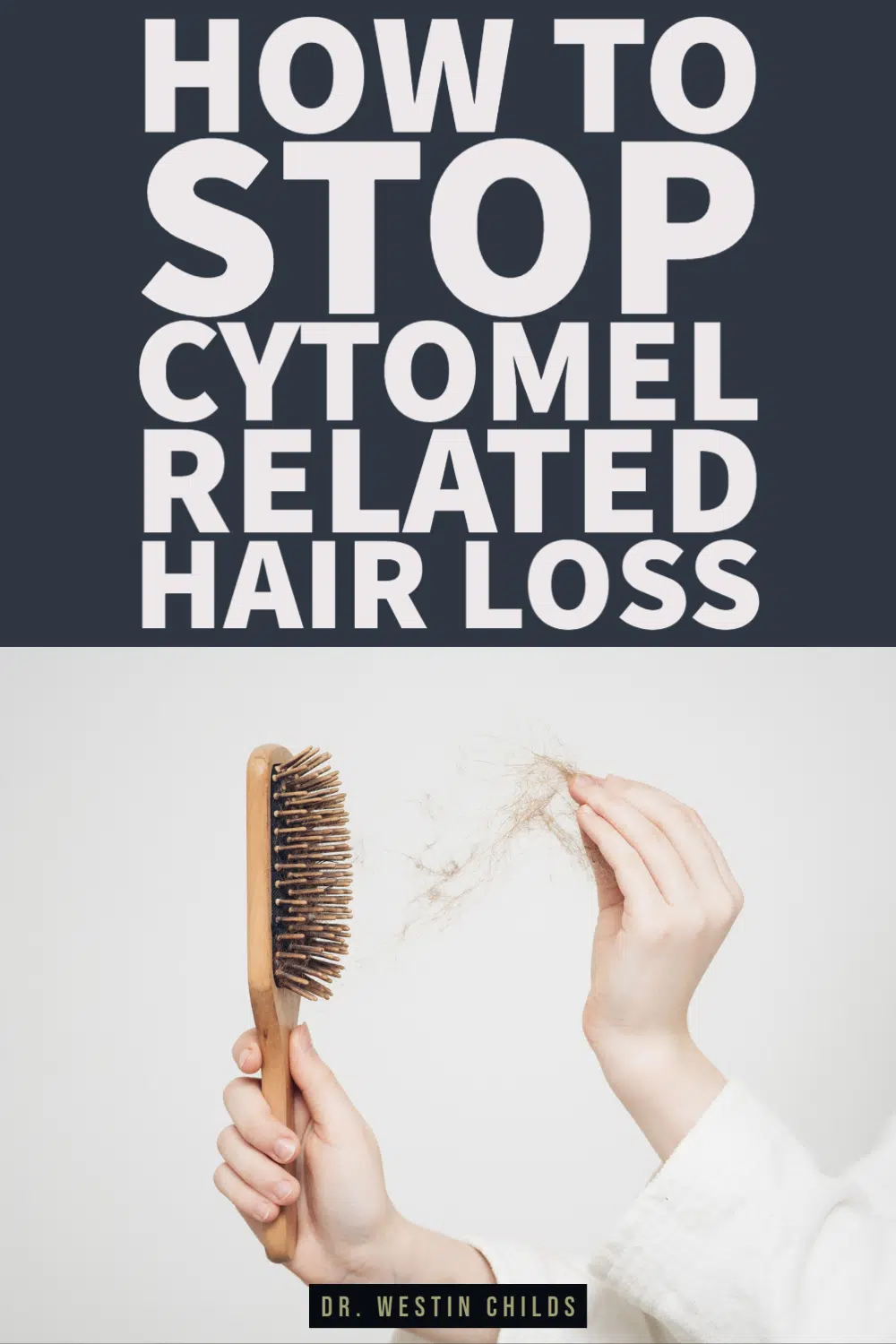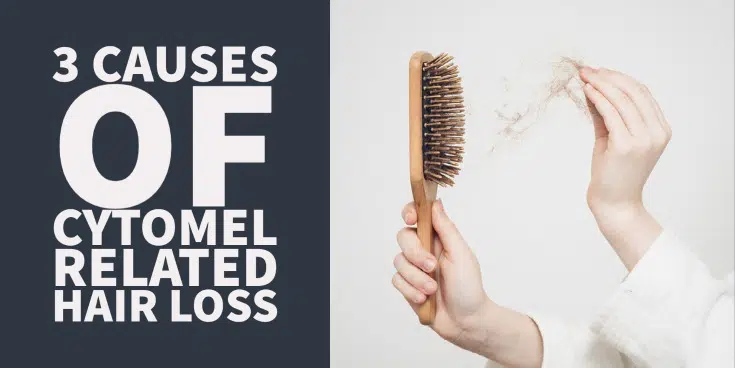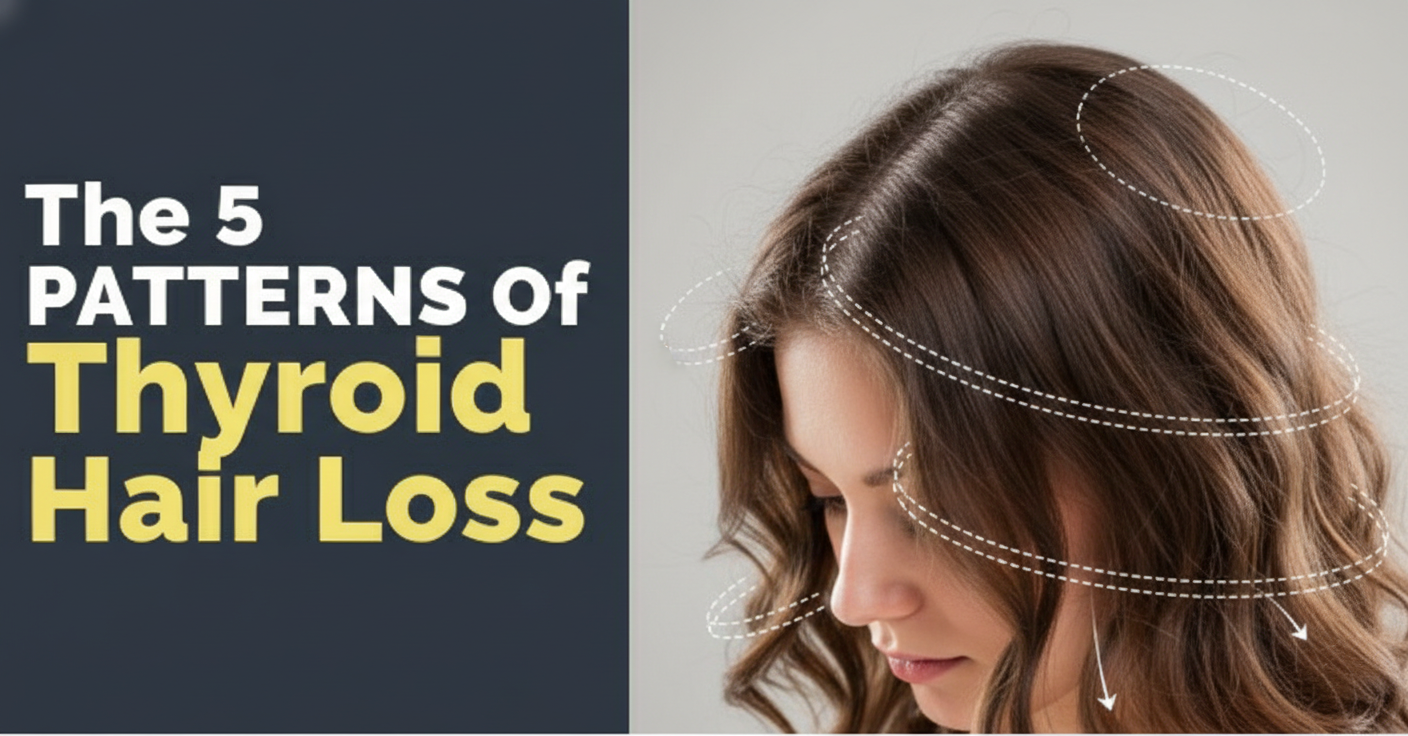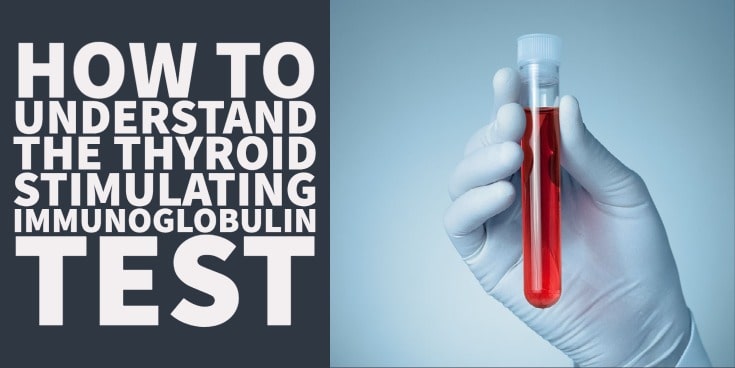If you are new to Cytomel, or if you’ve been using it for a long time, this information should be helpful!
While Cytomel is probably one of my favorite medications used to treat hypothyroidism and Hashimoto’s, it doesn’t come without risks and potential side effects.
Among these side effects is the potential for hair loss.
Don’t let this freak you out, however, because it can usually be treated very easily and most people experience hair GROWTH as long as they use it correctly.
This article will focus on the 3 main causes of Cytomel-related hair loss and how to deal with each one.
Cytomel and Hair Loss
What exactly is Cytomel?
Cytomel is a brand-name thyroid medication that contains only the thyroid hormone T3.
T3, as many of you are probably aware, is the single most powerful and biologically active thyroid hormone (1) that you can take which makes this medication the strongest thyroid medication available on the market.
This is both good and bad!
Good because it can potentially help many of you reading this and bad because many doctors are afraid to use it.
But, let’s get a few things straight:
#1. Cytomel should be respected but not feared.
#2. Cytomel is a potentially GREAT thyroid medication and can be used in conjunction with other thyroid medications such as Synthroid and levothyroxine.
#3. Most people who use it will NOT experience hair loss (in fact, they will probably experience hair growth).
And #4. All of this information here applies to BOTH Cytomel and liothyronine.
Cytomel is the brand name T3-only thyroid medication while liothyronine is the generic equivalent.
And in my experience, both medications can cause, exacerbate, or worsen existing hair loss.
The good news is, however, that in most cases it can be treated and reversed but it does require that you have some basic understanding of this medication and how it works in your body.
As a last special note, it’s also important for you to understand that Cytomel does not always cause hair loss or any of the symptoms I’m listing below.
In terms of the percentage of those who start Cytomel and do well, the vast majority of patients, as long as they are dosed correctly, find that they feel dramatically better and do not experience any negative side effects.
Perhaps only around 20% (again, in my experience) of people who start Cytomel will experience hair-related issues.
That means there is roughly an 80% chance that you will not have to deal with these issues.
With this in mind, let’s talk about some of the reasons that Cytomel causes hair loss.
#1. Side Effect of Cytomel Itself
The first reason has nothing to do with the T3 thyroid hormone in the medication but instead is probably related to the fillers, dyes, and binders found within.
It has been shown that Cytomel, the medication itself (2), can cause temporary hair loss in some patients who use it.

This hair loss has NOTHING to do with your dose (which is very important because the dose can play a role as we will discuss below).
This cause of hair loss has to be differentiated from the other causes of Cytomel-related hair loss because it is reversible and usually fades over time without any intervention or changes on your part.
You can compare this to the other causes we are going to discuss which require some changing of your dose in order to fix them.
The hair loss associated with this condition can be mild to moderate but it is typically a noticeable amount.
In my experience, patients are often very aware that it is happening, especially because they are usually sensitive to hair loss due to their diagnosis of hypothyroidism.
What to do about it:
The most important thing for you to do is not to get upset or freak out because you are noticing you are losing more hair.
Be patient!
Your best bet is to continue taking your prescribed dose and to retest your thyroid lab tests to determine that your dose is adequate (not too low and not too high).
If you have confirmed that your dose is optimal then your next step is to simply wait it out.
Most of the time, you will find that your hair will start to regrow within about 2 to 4 months.
If you go beyond that timeframe and you are still experiencing hair loss then it may be time to look at your dose or to consider other thyroid medications and options.
#2. Taking Too Much Cytomel
The next reason that some people experience hair loss when taking Cytomel has to do with taking too much of it.
This one is a no-brainer and is really the thing that most doctors are afraid of when prescribing this medication.
They fear that by giving your body T3 directly you will become hyperthyroid.
In addition to causing dry, brittle hair, hyperthyroidism can also cause hair loss directly (3).
And make no mistake, Cytomel can cause your body to become hyperthyroid.
But it will only cause hyperthyroidism if you take too much of it.
Most people who use Cytomel can use it without becoming hyperthyroid by watching their labs carefully and ensuring that their free T3 and total T3 do not become elevated and that their TSH is not suppressed.
So don’t let this scare you.
What to do about it:
The good news is that this side effect is actually quite easy to identify, at least compared to the other causes because it’s often associated with other side effects as well.
For instance:
If you are taking too much Cytomel you will probably also be experiencing symptoms which include heart palpitations, diarrhea, heat intolerance, anxiety, and jitteriness.
If you are experiencing any of these symptoms, in addition to hair loss, then it’s likely that your dose is too high.
You can confirm this by checking your thyroid lab tests.

You want to pay close attention to your free T3, total T3, and TSH as these tests will give you the most information about your body’s thyroid status.
If you find that your free/total T3 is elevated and that your TSH is suppressed then you may want to consider lowering your dose to bring your thyroid labs back into range.
As this happens, you should notice that your hair loss improves.
#3. Not Taking Enough Cytomel
This is probably the most common cause of hair loss after starting Cytomel and it tends to be dose-related but this time it’s related to not taking enough.
Why does this happen?
Most doctors, because they aren’t used to prescribing T3 medications such as Cytomel, tend to start with very low doses to be cautious.
This cautious approach isn’t necessarily bad, but it can cause issues if you are consistently underdosing patients especially if you are being transitioned from other thyroid medications such as levothyroxine.
If you are not taking a sufficiently high dose of Cytomel then your body will be in a hypothyroid state.
And you know, probably from experience, that the hypothyroid state is not only associated with hair loss but also with symptoms such as fatigue, constipation, depression, weight gain, and cold intolerance.
And these symptoms are particularly helpful in determining if your dose is too high, too low, or if your hair loss is a consequence of the medication itself.
What to do about it:
The good news is that this condition is readily treatable and the therapy is to simply increase your total dose of thyroid medication.
As you increase your dose you will bring your body into a euthyroid state (meaning a state of normal thyroid function) which will provide stimulation to your hair follicles (4).
You can do this by simply increasing your dose of Cytomel or by increasing other thyroid medications that you may be taking.
As you increase your dose, you will want to pay close attention to your total T3 and TSH.
As your total T3 approaches the top of the reference range, and as your TSH approaches the ‘optimal’ level you should find that your hair loss stops.
If you aren’t sure what ‘optimal’ thyroid lab tests look like then I would recommend that you read this detailed article for more information.
#4. Other Causes Not Related to Cytomel
I had to throw this one in here because there are plenty of other reasons that thyroid patients may experience hair loss that are not related to their medication.
These causes include conditions such as nutrient deficiencies, autoimmune diseases (5), and other hormone imbalances.
These can typically be differentiated from Cytomel-related hair loss because they should already be pre-existing when you start your medication.
If you think your hair loss has a nutritional component to it (which is very likely), the use of certain supplements is warranted.
Should you Avoid Cytomel?
I know it may sound like Cytomel is a medication worth avoiding, especially in the face of all of the issues that I’ve discussed here.
I’m here to tell you that I find that in almost every situation, however, the benefits of using Cytomel tend to far outweigh the potential cons.
This medication, including the generic version liothyronine, can potentially stand to help many of you out there reading this.
In addition, even those already suffering from hair loss, at least of the patients that I tend to treat, usually see an improvement in their hair growth after using Cytomel (6).
This isn’t universally true, however, and each person should be evaluated on a case-by-case basis.
But I don’t want you to believe that the majority of people struggle with these issues after they start the medication.
In fact, the opposite is quite true.
Most people do very well.
But for those people who do suffer from hair loss after starting, they need a resource to help them and this is exactly what this blog post is designed to do.
Conclusion
Does Cytomel cause hair loss?
It can, but not always.
If it does cause hair loss, it’s most often due to 1 of 3 major causes.
#1. Hair loss directly related to the medication (this is typically temporary and will go away without any treatment).
#2. Hair loss related to an excessively high dose (this can be treated by lowering your dose).
#3. Hair loss related to insufficient medication (this can be treated by increasing your dose).
If you are experiencing hair loss or if it worsened after taking Cytomel, then be sure to figure out which of these 3 causes is your main issue.
From there you should be able to find your treatment and regrow your hair!
Now I want to hear from you:
Are you currently suffering from Cytomel-related hair loss?
Do you know what is causing it?
What therapies have you tried?
Have they worked?
Leave your questions or comments below!
Scientific References
#1. https://www.ncbi.nlm.nih.gov/pubmed/556986
#2. https://medlineplus.gov/druginfo/meds/a682462.html
#3. https://www.ncbi.nlm.nih.gov/pmc/articles/PMC3749490/
#4. https://www.ncbi.nlm.nih.gov/pubmed/10792210
#5. https://www.ncbi.nlm.nih.gov/pmc/articles/PMC3746235/
#6. https://academic.oup.com/jcem/article/93/11/4381/2627273









Can a high bilirubin count be linked to hypothyroid conditions?
Hi Faye,
Not usually.
I’ve been struggling with profuse and diffuse hair loss since the first dose of synthetic T4 then after losing my thyroid, it got worse. I tried Tirosint then added T3 then switched and tried three different NDTs. I’ve lost 90% of my hair and can now see to my scalp. Over the different trials of thyroid replacement, I always noticed it made my hair loss worse. For instance, switching brands, using compounded T3, etc. would cause my hair loss to accelerate, then return to 50-100 loss per day. I have seen multiple specialists to try to figure out why I am losing all my hair: GP for iron and nutrient panel, ID for Lyme or other infections, dermatologist (hair pull 140+ hair), endocrinologist for female and FT3 & FT4, Gastro for parasites-none if these showed issues. I am at a loss. Literally. My ponytail is as thin as a pencil and I continue to lose 50-200 hair a day and now can see to my scalp. What do I do?
Hi Noelle,
It’s hard to say what the issue is because unless your doses were accurate it’s still possible that you’ve simply been undertreated this entire time. That could be one of many possible explanations.
I would suggest you stop wearing your hair in a ponytail if you do this daily. It may not be related to health issues at all but pulling your hair into a ponytail all the time. It started happening with my granddaughter when she was a cheerleader
Have been on levothyroxine for 8 years. Numbers have been optimal except for free T3 which was always low end of normal. Over last year fluctuated with that and below range. Started adding sustained release T3. Always have had an issue with up and down hair shedding and other hypo symptoms. I am now at a major shed at 3 months after starting t3 and reducing t4. Ft3 and ft4 are at mid-range TSH optimal. Not knowing if I should go back to t4 only or try to optimize numbers and change dosage again. Wondering if all these dosage changes can also affect hair fall??
Hi Sara,
Switching medications frequently certain clouds the situation and may contribute to hair fall but it’s difficult to say without really breaking it down.
I am one of the ones losing hair due to Cytomel (actually taking Liothyronine). I took Armour for years, took Levothyroxine when pregnant with my son and then switched back to Armour. Around two years ago, I finally switched back to Levothyroxine during the pregnancy of my third child. Both of my girls were growth restricted in the womb, one classified as severe growth restriction. At this point, I went back on Levothyroxine and my baby came out of the severe growth restriction category. I do wonder if that was due to Levothyroxine. At any rate, I have had hair loss for two years–during pregnancy with my third child and continuing. I also have brittle fingernails, and my weight will not go away. Otherwise, I feel pretty decent on T4. I just went to the Endo and she prescribed a very low dose of Cytomel (5 mcg). I have only taken this a week and when I washed my hair I was terrified with all the hair that came out. Last night I read where hair loss could be a side effect. It is easy to say don’t stress out, but I have been losing hair for 2 years and I don’t think I can afford to wait two to three months to see if it starts to grow back. Endo says I can cut back on T4 and see what happens. I may try that for a week. Have you ever had a patient to address nutrient deficiencies first and then add the T3 back in? I know I am deficient in Vitamin D.
Hi Janna,
I tend to do everything simultaneously, so I would never have a reason to have someone address nutrient deficiencies first.
Have taken Cytomel for several years with no problems until this January. When the shortage of Cytomel started, I could only find the 5 mcg tablets. When Cytomel became available again I took my usual dosage of 25 mcg. I immediately had a drop in energy. By the end of April, my hair started falling out. I called my pharmacy to see if I had been given a generic, which I cannot take, they assured me it was not. I noticed the bottle said the manufacturer was Monarch, Phyzer says this is their company…I am still losing my hair. Has anyone else noticed a change in Cytomel?
Hi Bonnie,
Thanks for sharing. I haven’t heard from anyone else experiencing that or similar issues but I will keep an eye out.
Hi Dr. Childs,
I started cytomel about 1 month ago and have started noticing more hair in the drain and my hair is noticeably thinner in a ponytail. Numbers are good and I feel good overall. Does the hair loss typically cease after a couple of months? How long to wait it out?
Thanks!
Hi Cari,
Yes, the article above outlines the 3 main causes and how to tell which situation you fit in and how long it takes to notice improvement (if you will see any).
Dear Dr. Childs,
I have Hashimoto for around 20 years (I am now 32 years) and have been treated with T4 only medication since then.
I switched between different manufacturers over time and for 3 months I am taking Tirosint.
I also took the contraceptive pill since I am 18.
Over the years I noticed more and more hair loss.
Three months ago I stopped with the contraceptive pill.
Since then my hair loss got much worse and there is no sign of getting better.
My recent thyroid lab tests were
TSH 3.27
FT3 2.7 pg/mL
FT4 1.2 ng/dL
RT3 0.31 ng/mL
Would you recommend trying a T3 only medication like cytomel to reduce the RT3 and increase FT3?
Or is the risk of increasing hair loss bigger?
Best regards,
Leonie
Dear Leonie: Based on what Dr. Childs has written, I would say you are under-medicated. First, I would recommend that you optimize your FT4, which should work to improve your too high TSH. It will also give you a clue regarding how well you convert T4 to T3. If your FT3 is still too low, that would be the time to add some T3 to your regimen, which would also help to lower your TSH. So, Dr. Childs, how did I do?
A very reasonable approach 🙂 There are obviously several options available but I would consider this to be a fairly conservative approach to get to the root cause.
My cytomel dosage was at 6.0 for over 6 months. I definitely felt my hair had become more dry and brittle. I lowered my meds and last lab it was still high at 4.4. My hair has thinned considerably and tons of breakage. I just lowered my medication again. I was also taking excessive amounts of biotin which I recently read can add to hair breakage. So I cut back on that and have added omega 3 and 15mg of Iron. Conditioning my hair several times a week now hoping to help what hair I still have.
Dr told me to lower cytomel that t4 is too high. She said cytomel makes t4. Now my hair is dry. Brittle. Lost hair thruout and big bald spot on right temple. When i shower a guinea pig of hair falls out. Afraid to shower. Hair all over bed. Do i go back to my 50 cytomel? She put me to 25
Hi Cathy,
Cytomel does not result in the creation of T4. In fact, taking Cytomel in increasingly higher doses will lower your free T4. Cytomel is a pure T3 medication which negates the need for T4 production from the thyroid gland.
Thank you for posting the informative article and all of the comments. I am new to taking Cytomel, as of Feb 2020 (5 mcg – 1.5 tabs in AM and 1 tab in PM), along with 150 mcg of Synthroid in AM. I’ve taken Synthroid for 25 years. I am experiencing mild hair loss (I have a lot of hair, thankfully) and am hopeful it will cease. Getting bloodwork done this week to see how I’m doing. I feel like I am coming out of a lifelong fog and I feel happier. So far, so good!
Hi! I was experiencing a great deal of hair loss, beginning when I was premenopausal. However, hair loss runs in my family. I was becoming more and more alarmed. I went to a dermatologist. He first found that my ferritin was low, and I took that until it got to hair-growing range. My doctor put me on 100 mg of spironolactone twice a day and biotin. After a while, my hair began to regrow! The people in his office were amazed. A hair pull showed NO hairs. After about 6 years doing great, I went to an endocrinologist because of severe hot flashes all day long in my sixties. I was already taking synthroid, 25 mg a day. My general practitioner recommended I move up to 50 mg a day after tests. The endocrinologist wanted me to try Cytomel 5 mg along with the synthroid-this was for hot flashes. I took the cytomel and 25 mg of synthroid. Since then, my general practioner has never said there was ant thyroid problem after my tests. My hot flashes, however, were not helped at all, but four years later, I have lost all the hair I regrew. My dermatologist said hair loss is common when taking t3 and t4 medications. I am considering stopping the Cytomel and going back to Synthroid only. I may increase it to 50 mg if my GP recommends. What is your opinion?
Hi there! I have hashimoto’s and was on armour for the last 15 years. I started having chronic hives and angioedema and a little bit of hair thinning. I’ve always had thick nice hair. It was suggested by my naturopath that I switch to levothyroxine and t3. I was originally on 10mg of t3 and my t3 was low and t3 at 8.8. She lowered me to 5mg. I’m just losing tons of hair and nails are brittle, skin is thin and dry. I don’t even recognize my hair anymore. My t3 is now 3.0 but the hair it still falling out in gobs. Should I go lower? How long before the thinning stops? Ahhhh!
Thank you!
Ever since I started thyroid medication for non-Hashis hypothyroidism I have suffered from bouts of shedding, especially when changing brands or doses. In fact I convinced my doctor to start me on T3 only treatment after reading your articles, and hearing that T3 is the “hair growth” hormone. However, the shedding has worsened over the past year, even though my TSH has largely come back to the optimal range (free T4 is very low, and despite supplementing, D vitamins remain low). Obviously everyone is experiencing a lot of stress these days due to the pandemic, which does not help. Do you think my dose is to blame, or something else? If I ever get off thyroid meds could I see regrow this? And also, would someone like me benefit from your hair growth supplements? Thank you.
Hi , I was in synthroid for a couple of years and then I went to cytomel . At first I lost 40 pounds and I was doing. Great . I’ve been on it about 4 years now . Thing is in the past few months I’m noticing hair thinning . Shedding that I thought was due to my hair being almost waist length .
I told my dr who then told me my thyroid level
Was a 5 and really should be a 2 !
So she upped my medication from 25mcg to 50mcg.
I’m absolutely shaken up by this hair loss as I had very thick hair . And now in just the past few months my hairs thinning .
My dr told me it’s because I should be at a level 2 instead of 5. Of course I’m upset cause she’s known this and never said anything . I’m so worried my hair will keep thinning and I’ll end up bald . I’m trying not to be upset and have faith . But I am highly upset my hair is so thin . Thing is I don’t get handfuls or 100 hairs a day . So idk what else to do . In five weeks I go back to have another blood test taken to see if my thyroid is up . Should I have a T4 with the cytomel ? What are my best options ? Pls help !
I have just changed meds from Armor to Tirosint 100 mg and Cytomel 25 mg 5 times a week, and Cytomel 50 mg 2xper week. But my hair has fallen out constantly and now have lost more than 75% of my hair, since I was first diagnosed with Hashimoto’s, hypothyroidism and Rheumatoid Arthritis. Even when I took 160 mg of Naturethroid. I take supplements for my thyroid, and take biotin, zinc, selenium, Opti-ferin C, fish oil, bioidentical progrsterone, estrogen, testosterone, and bio-silk which is collagen. What could it be causing my hair loss? I know it’s hard to tell without labs but I just don’t know anymore.
Hi Yolanda,
I would recommend checking out this article for more info: https://www.restartmed.com/thyroid-hair-loss/
Help! I just started 5mg liothyronine and was already on 90 NP thyroid. My T3 is still only 2.7 but my TSH dropped to .78…Is this because the T3 “cut off” the signal to my thyroid? Not sure if I should drop the T3 because I wasn’t feeling that bad before (just low metabolism and weight gain) or try to get the T3 increased? Thank you! This is really un-nerving and I am SO glad I found your article!!
Hi Mary,
All thyroid medications “shut off” the connection between your brain (pituitary) and the thyroid gland. T3 just happens to do this more effectively than other medications because it’s much more powerful. Whether or not this is an issue is another story, though, as some people need lower TSH levels in order to feel well.
Hello, Do any of your supplements help treat oscillating thyroid disease? I experience both hypo and hyper thyroid symptoms and it’s awful. I also get the side effects associated with both hypothyroidism and hyperthyroidism. I have a shelf full of supplements to treat the side effects of my condition aswell as taking both T4 and T3 to treat my actual condition. I feel very little improvement in my condition from the medications or the supplements but I fear I’d be worse off without them. Feeling like a stranger in my own body. Help?
Hi Emma,
You’d need to figure out the cause of the alternating thyroid disease before you can nail down treatment. There are many things that can cause your thyroid to oscillate between hypothyroidism and hyperthyroidism including the dose of thyroid medication and even autoimmune thyroid disease. The treatment will depend on the cause and, yes, supplements may be able to help depending on what that cause is.
I was diagnosed with Hashimoto’s in 2020. Labs within reference range, but not quite optimal. Antibodies very low. Minimal symptom of fatigue, but still able to be productive. Thought I could feel better, so started LDN and dietary change (gluten/dairy/soy-free). LDN caused sharp improvement in mood and more physical stamina, but still fatigue. Found a thyroid-literate doctor (they are rare!) and he prescribed 5 mcg liothyronine to start. On Day 2, my very long hair started falling out. By Day 5, it was excessive. E-mailed my doctor and he said to stop lio for 2 days and report back if the hair loss subsides. Frankly, I’d rather live with my fatigue than risk any further hair loss on liothyronine, even if it’s temporary. I’ve had 2 episodes of telogen effluvium in my past due to traumatic events. I made it through those. This is worse. I will not be able to handle emotionally handle it. Any thoughts on discontinuing the liothyronine altogether? Thank you!
All these comments made me scared to take it
Hi Julianne,
T3 is a great and safe thyroid medication, it just needs to be used correctly.